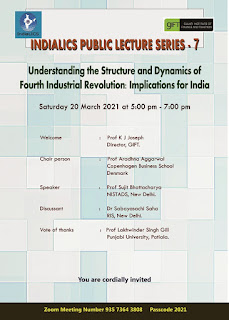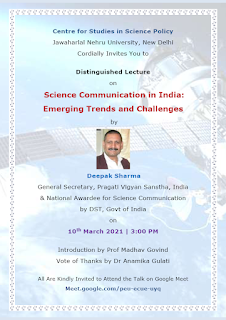Science Technology and Society (https://journals.sagepub.com/home/sts)
Dear All,
I am glad to share the special issue call for papers with you all here. The deadline for submissions is 15th of November, 2021. Detailed concept note is available here. As flagged in the concept note, selected manuscript authors will be invited to a workshop on the same theme to be hosted at Zhejiang University, China in late 2021. The special issue will later be converted to an open- access book. Looking forward to your valuable contributions. Should you need any further information or have any questions, kindly drop me a mail. Thank you enormously in anticipation!
Best Regards
Sheikh Fayaz Ahmad (PhD)
Innovation Researcher | Zhejiang University China.
Special Issue Background
The COVID‐19 pandemic has cast new light on worldwide socioeconomic susceptibility to exogenous shocks. This global crisis has been cited as being unlike any other in modern memory (Schwab & Malleret, 2020). In addition to sparking an unforeseen socioeconomic crisis, COVID-19 has exposed innovation systems' vulnerabilities as evidenced by innovation obstacles (Chesbrough, 2020) and overdependence on conventional approaches. More than a year after the pandemic's emergence, global citizens continue to grapple with adverse economic and health-related effects (Sohrabi et al., 2020; Zakaria, 2020). The virus has also unveiled deep flaws in the global public health infrastructure (Brands & Gavin, 2020). Susskind and Vines (2020) argued that COVID-19 has triggered the most severe global economic consequences since the South Sea Bubble burst in 1720. As COVID-19 is akin to a natural disaster, some economists have suggested that the outbreak could lead to severe economic crises—unlike a more standard financial crisis that follows from the arrogance of a few (Gans, 2021). Nearly all global governments are navigating the ramifications of the pandemic. A series of revelatory reports on COVID-19 have shown that its damage has exceeded expectations (Naidoo and Fisher, 2020; Zakaria, 2020). To date, COVID-19 has infected more than 124 million people and was projected to be responsible for global economic losses totaling between $5.8 trillion and $8.8 trillion by the end of 2020 (Bachman, 2020; Sarkis et al., 2020; Staff, 2020). The outbreak has also dragged millions into poverty; more than 265 million people were expected to struggle with hunger by late 2020 (Anthem, 2020). Further complicating governments' fight against COVID-19 are concerns of racial injustice, climate change, and economic inequality (Henderson, 2020; Mazzucato, 2021).
Amid the health, political, and economic crises unleashed by the pandemic (Rowan & Galanakis, 2020), COVID-19—similar to prior crises—has reignited debate around the dominant narrative across innovation and development discourses. Inherent tensions accompanying the prevailing producer's innovation paradigm (Cristensen, et al 2019; von Hippel, 2017) have become especially pronounced. The ruling economic system of capitalism has also come under fire (Yunus, 2018, Henderson, 2020). Muzzacato, (2021) asserted that the COVID-19 outbreak has illuminated the cracks in capitalism as well as its flaws. She further argued that there is no better time than now to rectify these issues—but that it will only be possible to do so by reimagining governments' roles, policies, and capitalism at large. Meanwhile, among criticism of existing growth and innovation models, many Nobel prizewinning economists have drawn hope from COVID-19: they believe that the pandemic has opened a window of opportunity to explore alternative innovation and growth models, even warning that returning to old models could be "equal to committing suicide" (Yunus, 2021).
People were advocating for revamped innovation and development models well before COVID-19. The environmental crises, institutional collapses, middle-income traps, stagflation, and wealth inequality that followed the 2008 recession ignited concerns about common innovation and growth models (Gordon, 2016; Heeks et al., 2014, p. 176; Piketty and Goldhammer 2017; Santiago, 2014, p. 1). Jacobs and Mazzucato (2016) pointed out that inequality has reached a peak unseen since the 1800s. 'Productivity-enhancing innovation' has declined as well (Gordon, 2016). Climate change and health crises such as COVID-19 continue to threaten global prosperity (Henderson, 2020; Mazzucato, 2021). So-called 'degenerative industrial activity' based on a linear industrial system has decimated natural cycles and siphoned natural resources (Raworth, 2017). Against this dark backdrop, financial greed from material through-flow has corroded intelligent, local, non-compensated, and sustainable innovation (Raworth, 2017).
Given such dysfunction, innovation and development models deserve renewed attention (Bhaduri, 2016; Bhatti et al., 2018; von Hippel, 2017; Mazzucato, 2021; Phelps, 2013; UNCTAD, 2017, Krishna, 2017). Scholars have advocated for recasting growth models such that externalities are primed to rectify pitfalls (Henderson, 2020; Yunus, 2018, Wu, 2020). Sustainability has also gained global traction, with experts recommending hybrid innovation models as a partial answer to climate change, inequality, and poverty (UNCTAD, 2017). More democratized innovation models, which can promote grassroots thinking and sustainability, are becoming increasingly popular (Godin & Vinck, 2017; Hippel, 2005). Development scholars have thus started to explore alternative paths to development and innovation that feature neither 'extraction' nor negative externalities. Even some argue that post-COVID-19 "development must have a radically transformative, egalitarian and inclusive knowledge and politics at its core" (Leach et al., 2021). The traditional "top down, rigid and orientated towards narrowly-defined economic goals" development model should be avoided.
Just as the pandemic has revealed the "fault lines of the world – most notably social divides, lack of fairness, absence of cooperation, failure of global governance and leadership," it has highlighted room for transformation. "Reinvention" is imperative if practitioners wish to thoroughly address global challenges (Schwab & Malleret, 2020). COVID-19 has inspired radical approaches to innovation, research and development, and community initiatives. Other problems, such as excessive institutional reliance on 'superspecialization' and 'databased decisions,' also call for innovation: ideas that encourage adaptability and experimentation can have far-reaching benefits (Knorringa & Bhaduri, 2020). The common assumption that red tape, bureaucracy, and government overreach inhibit innovation is changing as well; in fact, many have argued that public policy and government support are integral to a hopeful future. Weiss (2021) even contended that the government possesses the entrepreneurial spirit necessary to transform the public sector's responses to both major and minor problems.
The pandemic has compelled healthcare ecosystems worldwide to rethink their global strategies, moving from resilience to anti-fragility (Cobianchi, Dal Mas, et al., 2020). Seemingly countless modern technologies have flourished in response to COVID-19 (e.g., 3D printing, flexible manufacturing systems, big data analytics, and smart healthcare wearables) (Brem et al., 2021). In a similar vein, telehealth has led in-person clinical visits to be partly replaced by virtual consultations (Woolliscroft, 2020). Bottom up entrepreneurship featuring homegrown efforts to crowdsource innovations has also 'sparked creative collaborations to tackle timely issues (Ramadi & Nguyen, 2021). Digital technologies are being harnessed to support public health responses to COVID-19 as well (Budd et al., 2020). Frugal innovations (Harris et al., 2020) represent a notable bright spot. Rapidly reusing, repurposing, and recombining available resources and knowledge has become a prominent innovation strategy (von Krogh, 2020; Harris et al., 2020). COVID-19 has breathed new life into national innovation plans and accelerated pandemic-related interventions: governments have begun promoting local and international cooperation and imploring start-ups and other companies to fast-track promising mitigation measures (OECD, 2020). Open-source circular economy movements by innovators, designers, and activists are also being pursued to create regenerative economies worldwide (Raworth, 2017). Even healthcare organizations in advanced countries such as the U.S. are learning from Asia and Africa in the fight against the pandemic (Ramamurti, 2020), revealing a trend of reverse innovation from less to more developed economies (Ramamurti, 2020). Innovation policy is evolving dramatically. Economic growth is no longer considered the sole means of 'stimulating technological development'; 'solving concrete and pressing problems in society at large' currently dominates the innovation policy discourse (Wanzenböck, & Hekkert 2012).
Indicative List of Themes
In the wake of the pandemic and other global challenges, this special issue is intended to gather empirical insight on innovation, development, and innovation policy for a post-COVID-19 world. This special issue aims to identify the guiding principles of government innovation and development policy to overcome pressing challenges. We are especially interested in papers that highlight why it is necessary to recast prevailing innovation and development discourses and recommend inclusive and sustainable alternative pathways. The issue will be dedicated in exploring the under-researched areas of innovation policy, alternative, equitable, sustainable and inclusive development and innovation pathways. Papers that delineate the roles of alternative innovation models, frugal innovations, and grassroots innovations amid COVID-19 are welcomed. Conceptual papers and provocative essays that offer new perspectives on the roles of governments and mission-oriented innovation policy in combatting crises such as COVID-19 will be considered as well. We also encourage papers on digital innovations' potential applications and places in a sustainable, equitable future. Research on social innovations, secondary innovations, and bottom-up developmental practices with policy inferences is similarly sought after. We encourage submissions across broad disciplines with an array of theoretical and practical implications.
Guest Editors: Prof. Xiaobo Wu (Zhejiang University, China); Dr. Fayaz Ahmad Sheikh (Zhejiang University, China)
SAGE's Science, Technology and Society (STS) offers a fertile platform to debate questions on development, technology, and innovations. STS is a prestigious international peer-reviewed journal devoted to the interdisciplinary study of science and technology and innovations in social contexts. The journal is included in all major abstracting and indexing databases like Scopus, Social Sciences Citation Index (Web of Science) and etc. Selected manuscript authors will be invited to a workshop on the same theme to be hosted at Zhejiang University, China in late 2021. The special issue will later be converted to an open-access book.
Submission Guidelines for Science, Technology and Society: Complete manuscripts should be addressed to the guest editors of the special issue: Prof. Xiaobo Wu and Dr. Fayaz Ahmad Sheikh and also copy them to Dr. V.V. Krishna, Editor-in-Chief, Science, Technology and Society at following emails: stsjournal@gmail.com, xbwu@zju.edu.cn, sheikhfayaz@zju.edu.cn.
Important Dates
- First submission date 15 April 2021
- Deadline for full submissions 15 November, 2021
- Projected workshop date 30 December 2021
- Manuscript decisions 15 April 2022








